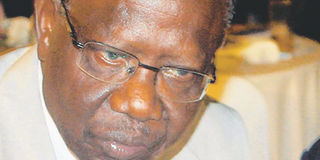50-year battle for Southern Sudan to be free

Advisor to the President of Southern Sudan Gen Joseph Lagu during the graduation of 32 diplomats from Southern Sudan in Mombasa recently. Photo/FILE
General Joseph Lagu doesn’t need to think how he will vote in Southern Sudan’s independence referendum: he’s been battling for the freedom of his homeland for the past half century.
“We began fighting for our independence with our bare hands,” said Lagu, who in 1963 abandoned his post as a young army lieutenant to command a rebellion fighting to split Africa’s largest nation into two.
“We would ambush government forces, lay landmines or blow up railway lines,” said the 79-year-old veteran, recalling the early days of battles against government forces. We saw no other option than to fight for the right of our people to live in freedom.”
Southern Sudanese are to begin voting on Sunday in a historic referendum for its potential full independence, a poll set up under the terms of a peace agreement to end the 1983-2005 civil war between the north and south.
But that was not the first war southerners fought for the right to choose a future for themselves. The first shots of the independence fight were fired in a 1955 mutiny in the Eastern Equatorian town of Torit, a year before the end of British colonial rule.
Low-level fighting rumbled on before the wider guerrilla war during which Lagu worked to bring the loosely organised rebels into a single force. Lagu called that rebel army the “Anyanya”, named after the deadly snake venom hunters dip their arrows into.
The rebels started with little. “We had only three old firearms to start with,” said Lagu. “I myself carried a machete. The general can still list the exact armoury he began the fight with: a 19th century British army rifle, a faulty sporting gun, and an ancient muzzle loader.
“We knew our cause was right, but we lacked the tools to do it with,” said Lagu, who gained his first major supplies from Congo, before winning Israel’s support, after Sudan backed Egypt following its defeat in the 1967 Six Day War.
That support helped build a considerable force. “People came to me to fight from all across the south,” said Lagu. “In the end we had about 18,000 men under arms.”
Some estimate about half a million people died, and many more were forced to flee their homes, before Lagu signed a deal in 1972.
“I was aware that the deal fell short of fulfilling the expectations of my people, but I knew too that my people needed a period of rest,” said Lagu, who would later head the south’s parliament set up under that accord.
The steady erosion by Khartoum of the agreement drove southerners to return to rebellion in 1983, fighting for equality within a secular Sudan.
Many Anyanya veterans would play key roles in that rebellion, including commander John Garang — who died in 2005 shortly after signing the peace agreement — and current southern president Salva Kiir.
Some two million people died in that round of conflict, battles fuelled by religion, ethnicity, ideology and resources, including oil.
For veterans like Lagu, the referendum is a climax of a life-long struggle.
“It gives me great happiness that God Almighty has preserved me to see my youngsters, people I have trained, continuing with what I participated in to start,” said Lagu, who is now an adviser to Kiir.
Southern leaders are well aware of that long struggle. “The referendum is an exercise that even the great, great parents had waited for, but never had the opportunity,” said Anne Itto, a top official in the Sudan Peoples’ Liberation Movement, the rebel movement turned political party.
“Maybe it is God’s will that it is our generation that chooses for the rest of the generations that were before and who will come in the future,” Itto added.
If Lagu has his way, south will split on July 9. “We are marching towards freedom,” said Lagu. “Nothing on earth can stop this.”




